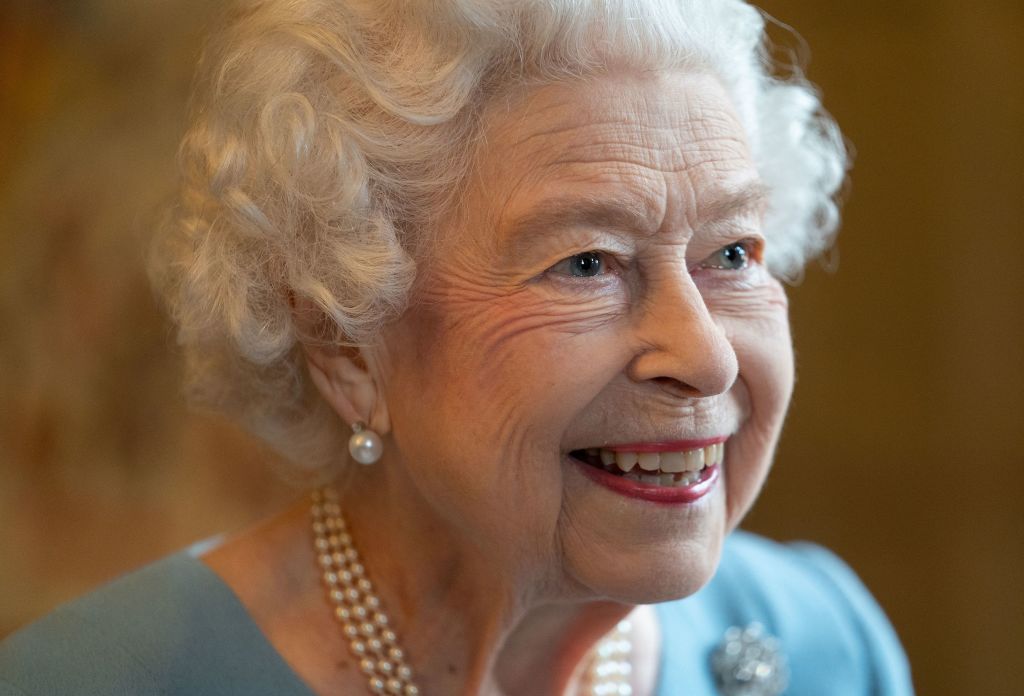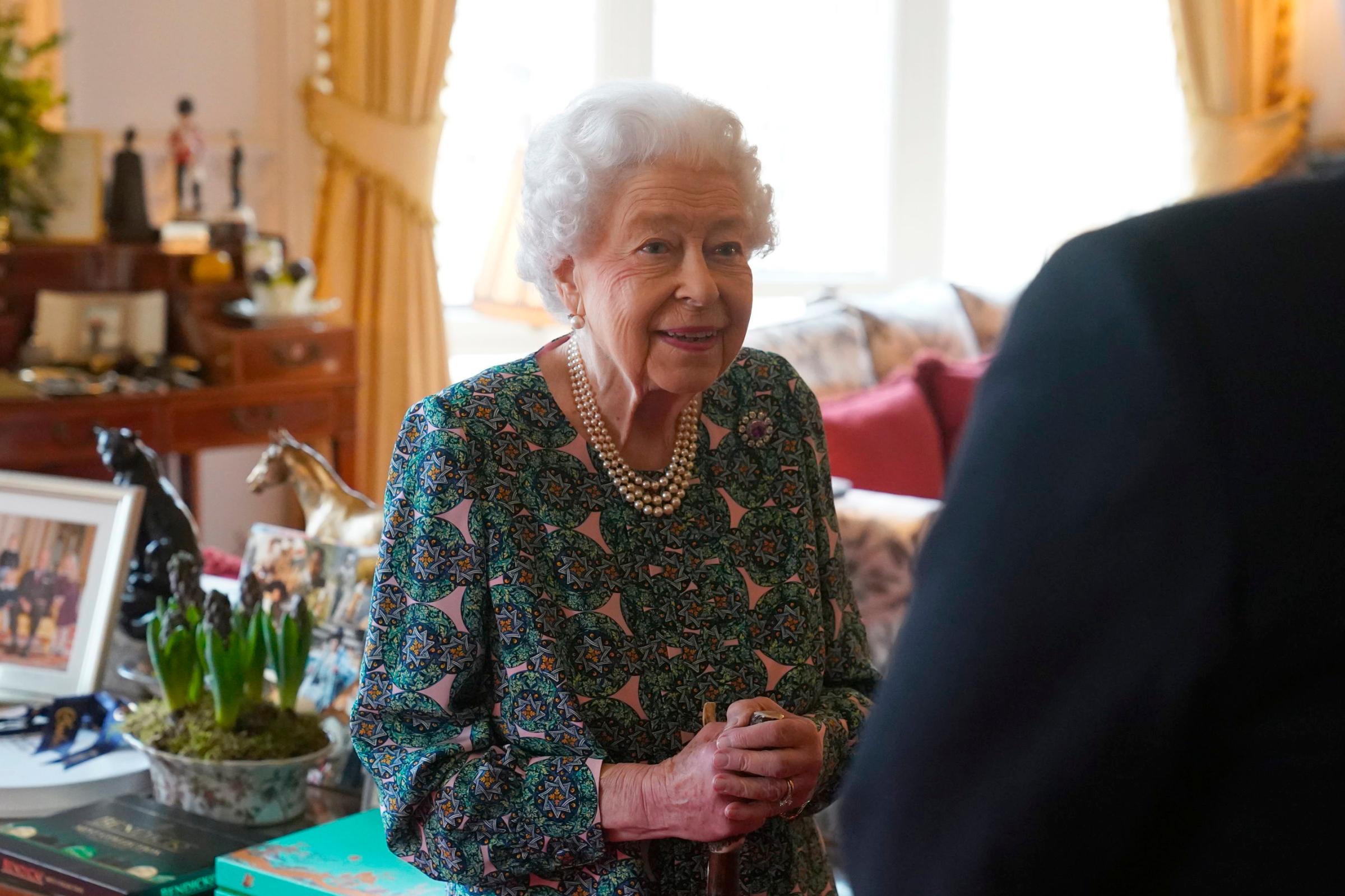
After avoiding the virus for almost two years, the U.K.’s longest serving monarch, 95-year-old Queen Elizabeth II tested positive for COVID-19 on Feb. 20. Famous for her stoicism in times of hardship, the Queen is planning to continue working, according to Buckingham Palace.
Following a week of scandal for the royal family, during which Prince Andrew agreed to a settlement in a civil sexual assault lawsuit, and the London police opened an investigation into Prince Charles’ charity, the positive test result came at a stressful time for the head of state. The Queen celebrates her 70-year anniversary on the throne, and will be expected at numerous upcoming engagements to celebrate the landmark.
Here’s what to know about the Queen’s positive COVID-19 test result, and what it means for the royal family and the U.K.:
Is the Queen vaccinated?
The Queen is fully vaccinated and has had a booster shot. “As far as I can make out, it was quite harmless,” she said of the vaccine in a video call with health officials in February 2021.
The shot “didn’t hurt at all,” she said. “Well once you’ve had the vaccine, you have a feeling of, you know, you’re protected.”
What are her symptoms so far?
In a statement, Buckingham Palace said the Queen is experiencing “mild coldlike symptoms”. The 95-year old monarch will “continue to receive medical attention and will follow all the appropriate guidelines.”
Will she still carry out her duties?
Despite her age and recent health complications, the Queen will continue to carry out “light duties” while she has the virus, Buckingham Palace said. The same day as her positive test result, she congratulated Team GB Women’s curling team for their gold medal win at the Beijing Winter Olympics.
In her 70 years on the throne, the longest reigning British monarch has been known for her robust health—she was photographed riding a horse as recently as 2020. Buckingham Palace generally does not release details about the Queen’s health, saying that medical matters are private. However, in the past year she has been seen using a walking stick, and in October she spent a night in a London hospital for unspecified tests.
At the time she was told to rest by her doctors and canceled appearances at key events, including the COP26 climate conference in Glasgow, Scotland in November.
This month she returned to public duties, meeting with diplomats, politicians and senior military officers. Just days before testing positive for COVID-19, she was caught on video walking slowly with a stick during her first in-person engagement of the year at Windsor Castle. Referring to her mobility issues, the Queen quipped “as you can see I can’t move”.

What happens if she can’t carry out her duties as monarch?
This year marks the Platinum Jubilee of the Queen’s reign. Accordingly, she has a busy schedule, with an upcoming diplomatic reception at Windsor on March 2 and the Commonwealth Service at Westminster Abbey on March 14. Public celebrations are scheduled over a long weekend from June 2 to June 5. Britons will enjoy an extra public holiday, while festivities including a military parade will take place in the Queen’s honor. The Queen is also scheduled to attend a remembrance service at Westminster Abbey March 29 for her husband Prince Philip, who died in April at 99.
However, onlookers have expressed concern that the Queen may need to reduce her public engagements as she recovers from COVID-19. Two or more senior members of the royal family, known as state counselors, can act on the Queen’s behalf if she needs to suspend her official duties because of illness or because she is abroad, the New York Times reported.
Since the Queen’s husband, Prince Philip, died last year, the next four senior adult family members in the line of succession would take on her responsibilities. That would be Prince Charles, Prince William and Prince Harry, and Prince Andrew. Charles and William are more likely to take on these responsibilities because both Harry and Andrew have stepped away from royal duties.
Has any other member of the British royal family contracted COVID-19 before?
The Queen’s eldest son, Prince Charles, 73, emerged from isolation on Feb. 17 after contracting COVID-19 sometime during the previous week. His wife Camilla, Duchess of Cornwall also tested positive. Just two days before his test, Charles met his mother at an investiture at her Windsor Castle home. This makes it possible that he could have passed the virus to his mother.
It was the second time Charles contracted the virus, after falling ill in March 2020.
Prince William, 39, contracted the virus in April 2020 but did not make it public to avoid alarm. The duke was hit “pretty hard” by the virus and at one stage struggled to breathe, according to British tabloid The Sun.
There are also thought to be several recent cases of the virus among staff at Windsor Castle, where the Queen is staying, according to the Associated Press.
What are the U.K.’s COVID-19 plans?
The Queen’s positive COVID-19 test result came just a day before Prime Minister Boris Johsnon unveiled the country’s “living with Covid” strategy, which will see an end to all COVID-19 restrictions. This includes the legal requirement to isolate after testing positive—which has been in place since mass testing was rolled out—and the end of free testing.
Some experts urged caution and the opposition Labour Party questioned the Conservatives’ plans to reduce testing, which Johnson previously said would take place at a “much lower level”.
The dramatic relaxing of restrictions has led to criticism by clinically vulnerable Britons, who say the end of self-isolation rules is a risk to their health.
Supporters of the rule change are touting the 95-year-old monarch’s decision to carry on working with the virus as a positive example for the nation. “Queen’s Covid Example to Us All” read the front page of The Daily Mail. In response, some Twitter users have argued against normalizing working while unwell.
What else should we know?
Testing positive for COVID-19 is just the latest difficulty facing the Queen. On Feb. 15, her second son Prince Andrew agreed to a settlement with Virginia Giuffre, who was suing the Prince over alleged sexual abuse when she was 17-years-old. The Queen is reportedly contributing nearly $3 million to Giuffre’s survivor support charity as part of the reported $16 million settlement.
Just a day after news broke of Andrew’s settlement, the Queen’s eldest son and heir, Prince Charles, was thrown into the limelight. Police in London announced an investigation into allegations that Charles’ charity the Prince’s Foundation was involved in a “cash for honors” deal in which a Saudi citizen was offered a knighthood in exchange for donations. Clarence House, Charles’ London residence, released a statement saying that the Prince had “no knowledge of the alleged offer of honors or British citizenship on the basis of donation to his charities.”
More Must-Reads from TIME
- Cybersecurity Experts Are Sounding the Alarm on DOGE
- Meet the 2025 Women of the Year
- The Harsh Truth About Disability Inclusion
- Why Do More Young Adults Have Cancer?
- Colman Domingo Leads With Radical Love
- How to Get Better at Doing Things Alone
- Michelle Zauner Stares Down the Darkness
Contact us at letters@time.com